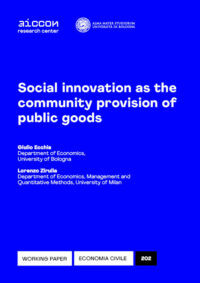202 – Social innovation as the community provision of public goods
Giulio Ecchia, Department of Economics, University of Bologna
Lorenzo Zirulia, Department of Economics, Management and Quantitative Methods, University of Milan
Abstract
In the last decades, social innovation has been widely discussed in academia, especially in sociology and political science, although a shared definition is still missing. To a large extent, academic economists were not part of the debate, which instead has flourished in policy circles.
The aim of this paper is to develop a model to analyze social innovation as the community provision of a public good.
On the “demand” side, we interpret social innovation as an imperfect substitute for a “traditional” group-specific public good, produced by the local government and financed by taxes.
On the “supply side”, social innovation is co-produced by “suppliers” (social innovators) and “consumers” (the members of the target group, i.e. those citizens who take advantage of the local public good) with the former being motivated by altruism (or empathy) in favor of the latter.
Our results focus on public policy towards social innovation.
From a welfare point of view, traditional public good and social innovation should coexist, with governments also involved in actively supporting social innovation via subsidies.
We also show that each community member can be better off with social innovation, as relying on social innovators’ intrinsic motivations can lower taxes used to finance traditional public goods and social innovation subsidies.
Finally, we show that the optimal policy towards social innovation typically depends on the social innovation co-production function characteristics.

